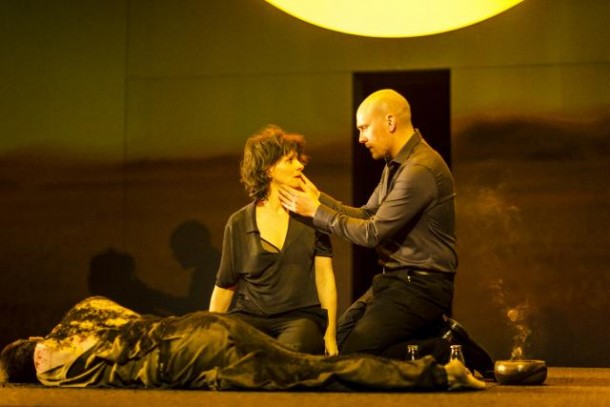With his acclaimed Young Vic production of Arthur Miller’s A View from the Bridge still playing to sold-out houses in London’s West End, Ivo van Hove turned his attention to a much older classic tragedy, Sophocles’ Antigone, which began a multi-city tour at the Grand Théâtre in Luxembourg at the end of February. The production is a joint effort of several entities, primarily the Barbican London and Les Théâtres de la Ville de Luxembourg (The Grand Théâtre and Théâtre des Capucins), in association with Toneelgroep Amsterdam, and is co-produced by the Edinburgh International Festival, Théâtre de la Ville—Paris, and the Ruhrfestspiele Recklinghausen.
This Antigone debuts a smart new translation by Anne Carson, which harmoniously melds contemporary, even colloquial, dialogue with a sturdy and often beautiful poeticism. It is a standout feature of the enterprise. The translation is layered against Jan Versweyweld’s stark scenography and gorgeous lighting and Tal Yarden’s often rather puzzling video, with van Hove shaping the whole around Juliette Binoche’s central performance as Antigone.
There is much to like in Binoche’s portrayal, though also a fair portion of perplexity. At the core, she is a strong but carefully measured Antigone. Here is no callow girl; the rage she vents toward her uncle Kreon’s cruel injustice (as she sees it) never threatens to teeter into adolescent ranting against a system built by and for an older generation. Indeed, the impetuousness of youth is never at issue in van Hove’s Thebes. The clashes of wills and beliefs that lay at the heart of the play are not here inter-generational in any literal sense.
Part of this comes from Binoche’s age. Although she looks far younger than she is, there is no mistaking her for a teenager. This is an adult Antigone. Her tenacity is that of a grown-up; her maturity and the personal assuredness that comes with it is devoid of youthful arrogance or impetuousness. She is instead a formidable and unmovable force. She does not pout and more importantly does not fear her uncle. She simply knows to her core that he is wrong. She will not, and cannot, follow his orders. Her conflict with him looms as a political struggle of not-quite-equals.
In discussions about the production and in his programme notes, van Hove describes Antigone as “most of all a play about survival,”not” of an individual, but of a whole society, perhaps even the world.” Accordingly, he focuses to a great extent on the Chorus—advisors to the king, but also representatives of the “people of Thebes.” They watch and listen and react mostly from a lower stage level that is designed to resemble bland corporate—or more likely—civic offices. The Chorus shifts viewpoints and allegiances. They are with Kreon, then with Antigone, then emergent as their own theatrical vox populi.
This representation of the people also incorporates one of the production’s more baffling and even distracting elements: the upstage video projections. Tal Yarden has created a series of indistinct images of the inhabitants of Thebes, all shadowy figures. These are juxtaposed with images of a bleak, sun-baked landscape outside the walls. The latter images, though perhaps superfluous, at least enhance the representation of the setting. It can be argued that they add logically to the event. However, the vague figures of, presumably Thebans, add little and serve mainly as blurry visual interruptions to the action.
At the conclusion, the images sharpen to those of the bustling metropolis, punctuating the onstage scene of the Chorus setting about the bureaucratic and administrative tasks of running the city. Here, finally, these video images make some sense, although the emotional payoff is, like so much in this production, subdued. Together, the images and stage activity do succeed to some extent in creating the effect of a society that has, in van Hove’s vision, survived—despite the deaths of most of the ruling family and the political roiling that has permeated and shaped events. Yet the effect feels more like an afterthought than an integrated part of the whole. It added to what I have described elsewhere as a clinical detachment to the production and indeed this seemed often to be the point in this calculated and disciplined piece.
Still, there is much beauty as well. Versweyweld’s sets and lights are stunning and often hypnotic to view: the opening sequences with the huge golden shimmering sun, Antigone’s slow plod across the stage against the wind to Polyneikes’ body—the visual treasures are many. The actors too are uniformly solid. Patrick O’Kane’s Kreon is convincing as the former commander who believes he is acting only in the city’s best interests. I was particularly impressed with Obi Abili, who steps out of the Chorus in a fine turn as the Guard, and Kathryn Pogson, whose Euridike seems briefly to break through the production’s carefully studied veneer. Finbar Lynch is also very good as Tiresias, the blind prophet who tries to convince Kreon of the impending dangerous consequences of his actions.

Juliette Binoche and Samuel Edward-Cook in Antigone directed by Ivo van Hove.
Photo credit: Jan Versweyveld
But it nonetheless is strangely dispassionate. I often felt I was witnessing a religious rite of a faith tradition with which I had no connection and about which I knew very little. Daniel Freitag’s sound design and music are heavily reliant on a thudding, pulsating, incantatory rhythm, making it all feel very ritualistic. This of course is perhaps entirely appropriate for a theatrical form that was entwined with religion; it may well reflect how audiences of twenty-five-hundred years ago felt when they saw Antigone. I, however, felt rather unsatisfied. The emotional catharsis which seems so important to Greek tragedy felt more like an intellectual exercise, perfunctorily presented, but lacking the depth and texture of theatrical passion. I was reminded of some of Robert Wilson’s productions where the visual imagery made me gasp, but the flat emotional content ultimately left me cold.
Binoche, as strong as she is, and as engaging as she can be within that strength, never quite breaks through the passion barrier. Her Antigone’s grief is dutiful and measured and precise, but is never quite gut wrenching in a way that the play seems to demand. While grief expressed through a sense of duty that runs so deep it cannot be questioned and the specific actions that absolutely must be taken—the rites that must be performed—is wonderfully interesting, it is not always automatically theatrically engaging. To the non-believer, a religious ceremony can fascinate in a quasi-anthropological way, but it does not necessarily move the observer. Thus, the careful measurement and calculation of grief on display here strips the play of some of its raw power.
Van Hove believes that understanding Antigone as a play requires looking to Sophocles’ Oedipus at Colonus, the tragedy that explores the events preceding Antigone (although it was a later work). In Oedipus at Colonus, the civil war that breaks out between Polyneikes’ and Eteokles’ (Antigone’s brothers) supporters—which results in both their deaths—is depicted. Antigone, then, for van Hove, brings us a Kreon who is a highly successful military leader who seeks to save Thebes by ruling it as a general commands an army. Absolute duty requires absolute obedience, and that discipline will bring the city past its grief; with discipline, the society—’the world’ at least as far as the play is concerned—will be saved. Personal grief, though, cannot be ordered and regimented. Antigone sees her duty as a sister and a person to disobey the political order and give her brother the burial every person’s dignity requires.
The central characters in this production are reacting to forces far greater than themselves, but despite the ritualistic religious overtones, those reactions seem more automatic and automated than genuine. The responses seem more to be the rote exercises of a populace under authoritarianism than those of people whose lives are guided and toyed with by the gods. Although van Hove speaks of the play as one of survival and of family and psychology and politics, his production here seems mostly to play out according to quotidian demands of the latter, with religious duty hinted at in an attempt to raise the emotional stakes. (Indeed, in this regard, the play and the production seem most contemporary.)
Make no mistake: the craft on offer in this production is excellent. Every detail is precisely rendered and executed. The artistry of those involved cannot be doubted. It is complete and whole within the confines and strictures of the production’s concept. The internal dramaturgical logic is flawless. It is thoughtful and it made me think. I was intrigued.
But I was never really moved. It seemed so very careful with the stakes and the emotions sadly never quite scaling cathartic heights. The inevitable consequences and downfalls of the characters were logical and ordered and as unavoidable as they must be in a tragedy.
They just weren’t actually tragic.
is the Founder and Artistic Director of Actors Repertory Theatre Luxembourg, a professional English-language theatre company, and an independent scholar and educator. He has published in Contemporary Theatre Review and Western European Stages and writes for the English-language version of the Luxembourger Wort, the national newspaper of Luxembourg. He has a PhD in Theatre from the City University of New York Graduate Center.
European Stages, vol. 4, no. 1 (Spring 2015)
Editorial Board:
Marvin Carlson, Senior Editor, Founder
Krystyna Illakowicz, Co-Editor
Dominika Laster, Co-Editor
Editorial Staff:
Elizabeth Hickman, Managing Editor
Bhargav Rani, Editorial Assistant
Advisory Board:
Joshua Abrams
Christopher Balme
Maria Delgado
Allen Kuharsky
Jennifer Parker-Starbuck
Magda Romańska
Laurence Senelick
Daniele Vianello
Phyllis Zatlin
Table of Contents:
- Report from Berlin by Yvonne Shafer
- Performing Protest/Protesting Performance: Golgota Picnic in Warsaw by Chris Rzonca
- A Mad World My Masters at the Barbican by Marvin Carlson
- Grief, Family, Politics, but no Passion: Ivo van Hove’s Antigone by Erik Abbott
- Not Not I: Undoing Representation with Dead Centre’s Lippy by Daniel Sack
- In the Name of Our Peasants: History and Identity in Ukrainian and Polish Contemporary Theatre by Oksana Dudko
- Performances at a Symposium: “Theatre as a Laboratory for Community Interaction” at Odin Teatret, Holstebro, Denmark, May, 2014 by Seth Baumrin
- Songs of Lear by the Polish Song of the Goat Theatre by Lauren Dubowski
- Silence, Shakespeare and the Art of Taking Sides, Report from Barcelona by Maria M. Delgado
- Little Theatres and Small Casts: Madrid Stage in October 2014 by Phyllis Zatlin
- Gobrowicz’s and Ronconi’s Pornography without Scandal by Daniele Vianello
- Majster a Margaréta in Teatro Tatro, Slovakia by Miroslav Ballay
- Remnants of the Welfare State: A Community of Humans and Other Animals on the Main Stage of the Finnish National Theatre by Outi Lahtinen
- Mnouchkine’s Macbeth at the Cartoucherie by Marvin Carlson
- Awantura Warszawska and History in the Making: Michał Zadara’s Docudrama, Warsaw Uprising Museum, August, 2011 by Krystyna Illakowicz and Chris Rzonca
Martin E. Segal Theatre Center:
Frank Hentschker, Executive Director
Marvin Carlson, Director of Publications
Rebecca Sheahan, Managing Director
©2015 by Martin E. Segal Theatre Center
The Graduate Center CUNY Graduate Center
365 Fifth Avenue
New York NY 10016




